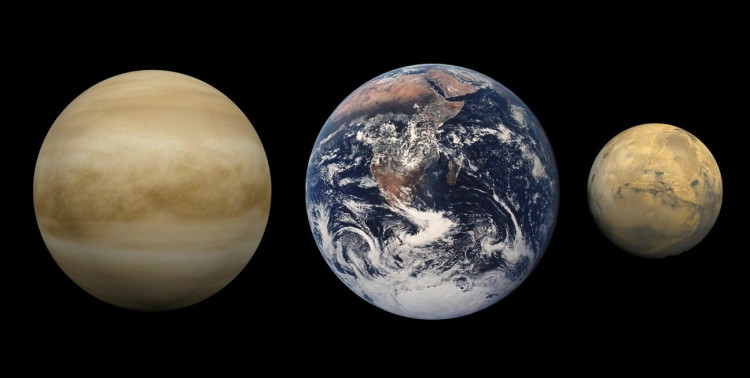Earth has all the right features to support life; Venus has a thick poisonous atmosphere, and Mars hardly has one at all. Three different planets, all having unique features. But these neighbors of ours -- they can teach us a lot about Earth's past and the potential scenarios of our planet in the future.
All three planets share a common history: 4.6 billion years ago, they were created out of the same swirling cloud of dust and gas, forming around a newborn Sun. and with the help of gravity, dust gathered and formed into boulders, eventually evolving into entities that we now call planets.
At some point in our solar system's history, Earth, Venus, and Mars carved their respective paths. The one's solid Earth cracked into plates, dividing into massive landforms of different kinds. To this day, Earth's tectonic plates continue to move, giving rise to earthquakes or volcanic eruptions.
Venus has no discernable plate tectonic system, but scientists have recently discovered that the planet may still have volcanic activity and its surface seems to have amassed lavas as recently as half a billion years ago.
As for Mars, it cooled off earlier than Venus and Earth. The death of its volcanoes meant the loss of support for its atmosphere as well. But found on the Red Planet is the largest volcano in all of the solar system, the geological wonder that is Olympus Mons, which is also the result of a continuous movement of the planet's crust. And although there are occasional quakes on Mars, and there's been evidence of tectonic activity within the last 10 million years, experts believe there is no tectonics system on the Red Planet that's similar to Earth.
So yes, all three planets started off similarly, but Venus and Mars both had some catastrophic climate events that meant losing its water system. Mars became too cold, and Venus became Earth's hellish twin. Only Earth remained habitable.
Our planet managed to hold in its waters, which sprung life and evolved into complex living organisms. But will there come a day Earth will see an atmosphere as hot as Venus? Or will it end up cold and barren like Mars?
Studying how planets form and evolve is important so we can understand climatic changes on our home planet. Space probes do their work in providing us with data, which should be a reminder to all of us that climate stability should not be taken for granted.






